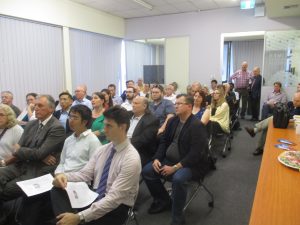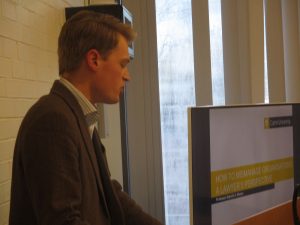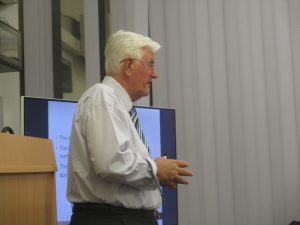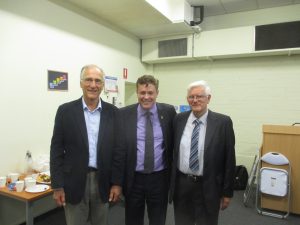On 28 February the Western Australian Legal Theory Association had its first meeting of 2018. The meeting was a tremendous success with a packed house eager to hear our speakers.

Mr Martyn Iles opened the evening speaking about the importance of human rights in the modern era, most notably the freedom of belief which rests on freedom of speech and expression. He warned of the dangers of increasingly Orwellian approaches to legislation which, no matter how well intentioned in their drafting, often result in encroaching on the rights of Australians.

He recounted a number of recent cases handled by the Australian Human Rights Law Alliance, and other lawyers which never should have reached a court, commission or tribunal. As we are seeing increasingly in Australia is litigation commenced on the basis of being upset by something – Cases which under the law of tort would fail miserably, are given merit by so-called rights legislation, which more often result in the infringement of rights rather than the protection of individual rights.
Following Mr Iles rousing speech was our headline speaker, Emeritus Professor Gabriel Moens. Professor Moens lecture was “How to Mismanage Organisations, A Lawyers Perspective”. The lecture is perhaps best described in the words of Professor Moens himself:
It is not unusual for employees to allege that the organisations for which they work are mismanaged. Even if these allegations are unsupported, the fact that they are raised regularly justifies an examination of how organisations may be mismanaged. This lecture focuses on actions or practices by senior management which may potentially result in the mismanagement of their organisations. In particular, this lecture identifies four interrelated management practices which, in my experience, constitute ‘mismanagement’: (i) the appointment of managers to their level of incompetence (the Peter Principle), which in turn may lead to occupational stress and low staff morale, (ii) the appointment of employees who are deemed to be less ‘intelligent’ than, or ‘inferior’ to, the appointers, (iii) the centralisation of resources, services and decision-making by relevant organisations, arguably to improve efficiency and to achieve cost effectiveness, and (iv) constant restructuring of organisations and associated change management. The purpose of this lecture is to promote and to enhance sound management practices in organisations.
Professor Moens introduced the topic with a recount of a law school dean who sent to all members of the faculty a lengthy emailing instructing staff to “not use school property for private purposes” – which even included the use of the refrigerator in the staff room. As professor Moens pointed out this is a prime example of how to mismanage an organisation, this dean spent a significant amount of time doing something that needn’t be done, and distracted him from more important and pressing work, and thus began the lecture.

The lecture covered the Peter Principle (an employee rises to his level of incompetence if there is a mismatch between the employee’s skills, experiences and qualifications, and his/her occupational role) and the limitations of this theory. It also covered the Peter Principle and the management of stress, focusing on that in the legal profession, the importance of ‘emotional intelligence’, the appointment of people seen as inferior to their employers/managers, hiring the right people, the woes of the centralisation of resources, services and decision-making, the use and misuse of restructuring, and change management.

The talks given by our esteemed guests were very well received by all, with discussion going late into the evening.
We would like to thank our speakers Emeritus Professor Gabriel Moens and Mr Marytn Iles for an enlightening evening, and our guests and members who made the evening such a success.
If you wish to join our association (membership is free) please click here.
If you wish to attend our next meeting to be held on 18 April featuring Professor Michael Quinlan please see our previous post.
We thank you all for such a strong start to 2018.